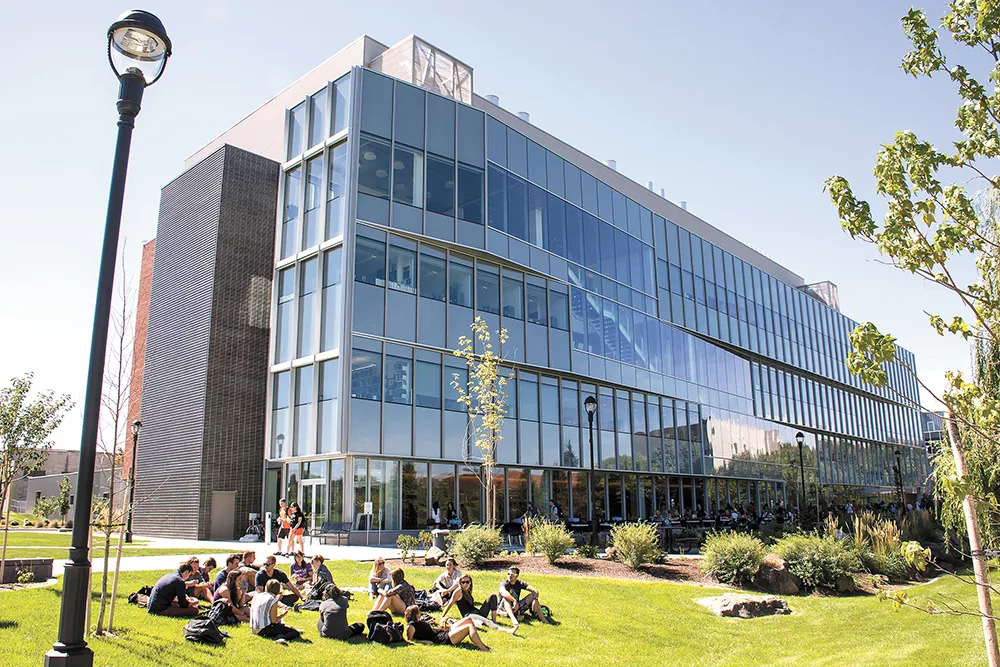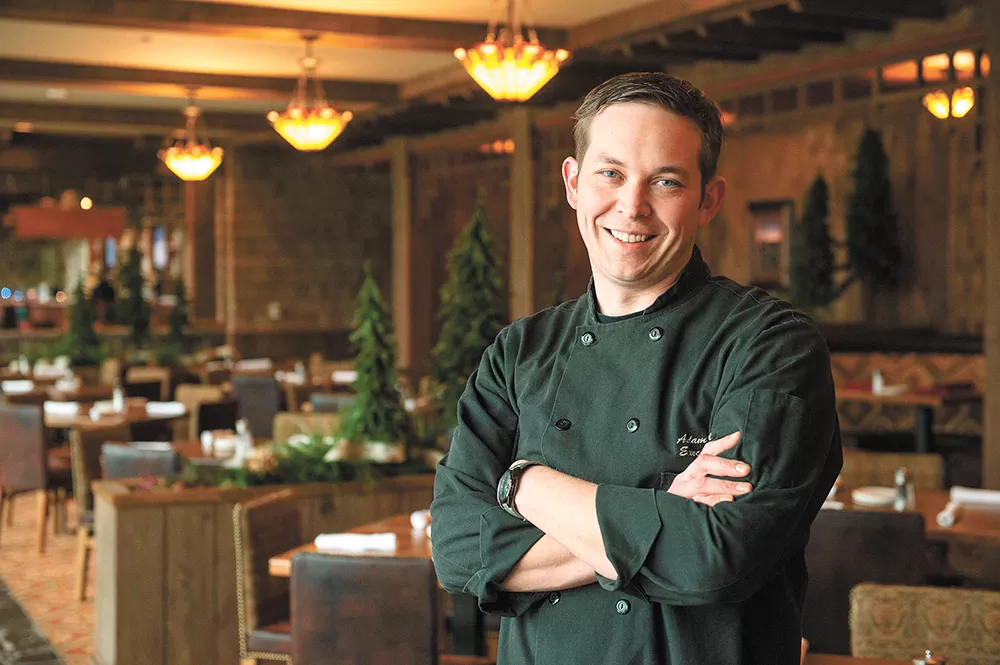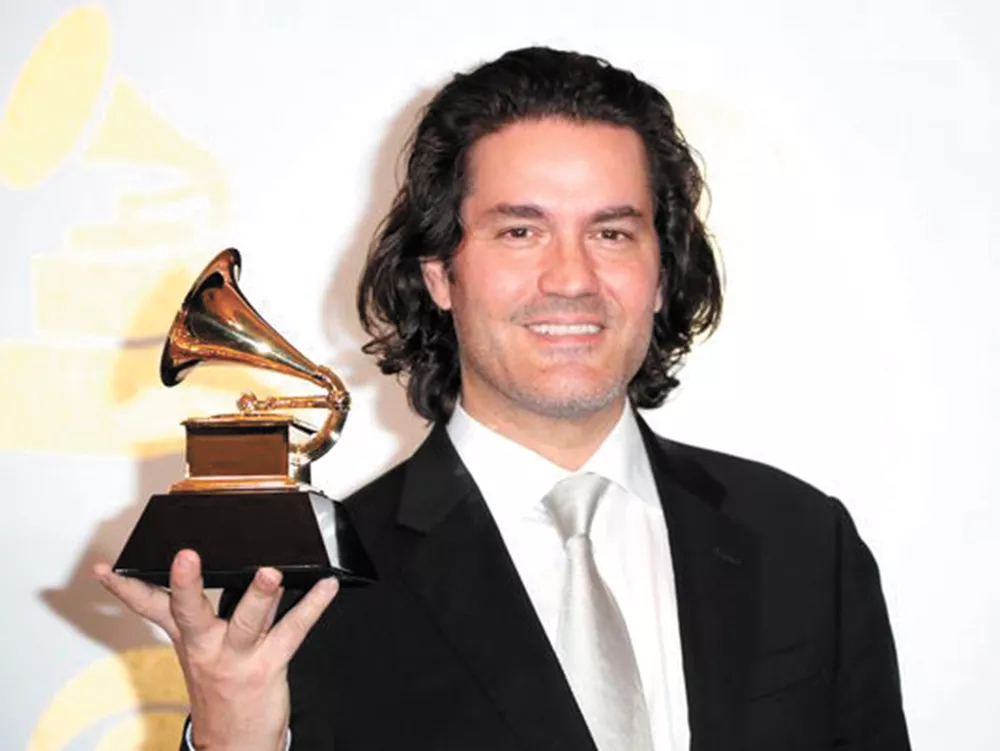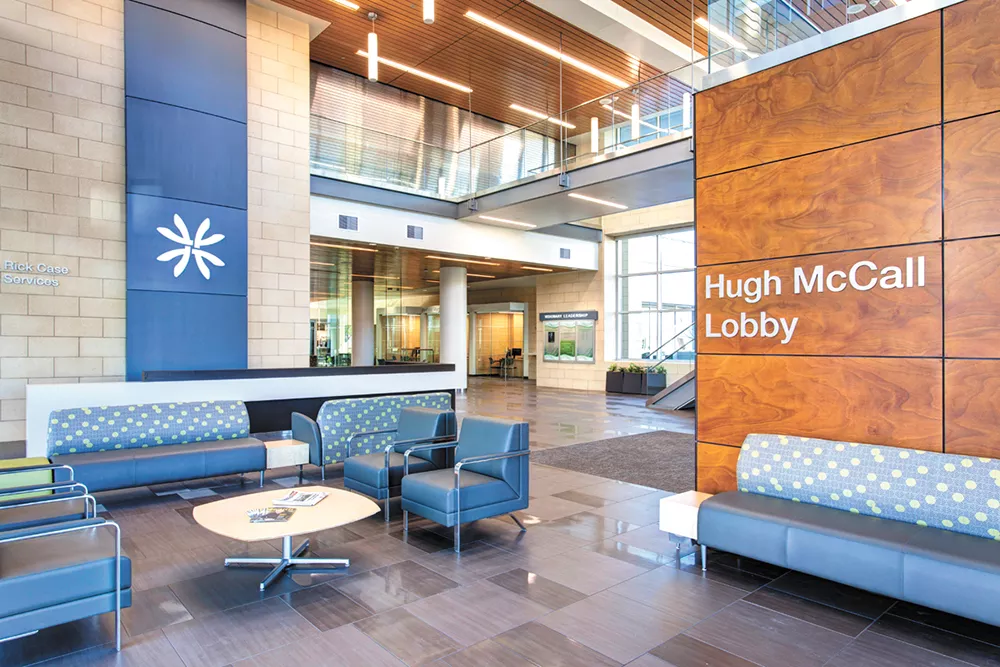The Riverfront Park ice ribbon finally unfurls
In the three years since voters approved the $64.3 million bond to reconstruct Riverfront Park, the development process has been slowed by setbacks and controversy. Frustration over unexpected costs and controversial design decisions even became a key plank in former Park Board member Andy Dunau's unsuccessful city council race in November.
But when the park's first new feature, the ice ribbon on the south bank, finally opened in December, most of those debates were set aside as thousands of residents flocked to the attraction. There was plenty to buzz about. A miniature rink on the west side of the loop gave would-be Brian Boitanos and Michelle Kwans space to practice their pirouettes and triple lutzes. Within just a few weeks, the ice ribbon had blown away the revenue that the old Ice Palace had made in an entire year. (DANIEL WALTERS)
City and county leaders create aneconomic runway for aerospace development
At times, Spokane County and the city of Spokane have feuded over sprawl, water rights and annexation. But last year, we saw what could happen when the two sides team up. Joining forces with the Spokane International Airport, local leaders like Council President Ben Stuckart and County Commissioner Al French created the West Plains Public Development Authority, a zone encompassing the airport and several thousand extra acres of county and city land nearby. The goal was to both strip away the bureaucracy that can impede major aerospace manufacturers from moving to the area and dangle enough incentives to tantalize local manufacturers.
And just months after the board started meeting, it had already set its crosshairs on a major target: Boeing's new midsize airplane. The West Plains PDA, as well as Greater Spokane, Inc., is pitching Spokane County as the perfect spot for the airplane to be designed, built and assembled. (DANIEL WALTERS)
Coeur d'Alene Tribe opens aviary, is honored for powwow workouts, and more
Since opening the first tribal aviary in the Pacific Northwest in late 2016, the Coeur d'Alene Tribe has been providing care and a permanent home for eagles who have been injured and couldn't survive in the wild. As eagles have sacred or spiritual importance for many tribal members, their aviary may gather the feathers that the birds shed naturally and the tribe may distribute them to verified members of federal tribes.
The Coeur d'Alene Tribe also gained national media coverage in early 2017 for a series of "Powwow Sweat" workout routines it developed based on traditional powwow dances, with help from a federal grant. And in other health news, in late 2017, the tribe changed the name of its Benewah Medical & Wellness Center to the Marimn Health and Wellness Center, using the tribe's traditional word "marimn" which means "medicine" or "they treat others." (SAMANTHA WOHLFEIL)
Spokane fills in the holes
Last winter featured massive snowfall, an eruption of potholes and the sudden, unexplained firing of the city of Spokane's streets director. But with new leadership helming the department, the city eagerly sought to figure out a faster way to fill the craters and fissures that scar Spokane's streets. A flurry of brainstorming followed and by the end of it, the city had charted a new course: Employees from the water and wastewater departments were tapped to lend extra pothole-filling hands to go out with the street department. New sorts of materials and a fancy new all-in-one pothole-filling piece of equipment were tested on Spokane's streets. And a local asphalt plant opened early in order to provide crews with a more effective hot asphalt mix.
By the end of the year, the city had launched a new snow-plowing strategy, too, one that finally got tested in the last days of December. (DANIEL WALTERS)

Downtown Spokane gears up for a residential explosion
It's been nearly a decade since the old Ridpath Hotel went dark in 2008. But in 2017, after all the legal disputes, ownership struggles, bankruptcy cases and fraud investigations had been untangled, developer Ron Wells was able to finally start construction in order to transform the historic hotel into a new Ridpath apartment complex.
"It's the best of Spokane's past, present and future coming together in the Ridpath," says Lars Gilberts, CEO of the University District to the east of downtown. "Symbolically, I love that."
The Ridpath, he notes, is just one of a major spate of new residential projects being constructed in the downtown core and its immediate outskirts.
"The thing that I think most about, and that I'm hearing the most talk about, is bringing residential downtown," Gilberts says.
In the past two years, the vacancy rate in Spokane County has plummeted, sending demand for new apartments and homes soaring. Spokane needs all the units it can get, but the local developers are delivering.
The Cowles Company, which owns the Spokesman-Review, bought the old Macy's building in order to turn it into The M, a mixed-use complex that includes over 100 apartment units. In April, over a half-dozen new apartments in the company's Chronicle building also came on the market.
"The M is beautiful," Gilberts says. "It's a next evolution of what a single owner with a vision can do for the good of a community."
Across the river, developer Larry Stone wants to turn the old YWCA property into hundreds of swanky apartments, hotel rooms and condos in a two-tower building called The Falls. At the same time, Kendall Yards developer Greenstone prepares to construct 120 new apartments in a multi-use complex near their new My Fresh Basket grocery store.
Yet Spokane city leaders also see barriers preventing downtown Spokane from bringing the dense residential housing that the market craves: City Council President Ben Stuckart sees the large number of downtown surface parking lots as taking up large swaths of downtown real estate while providing little comparative value.
"I want to create more covered parking," Stuckart says. "Less surface parking lots."
Stuckart is pushing a proposal from the Downtown Spokane Partnership to give tax breaks to developers who build anything — including a parking garage — to replace a surface parking lot.
Combine that strategy with the under-construction pedestrian bridge in the University District and the upcoming Central City Line electric bus route, and downtown theoretically moves one step closer to a dense, thriving big-city core.
As the slew of planned properties begin to come online in 2018, Gilberts says, will be the real test for just how deep the demand for residential units is.
"Everybody has realized there's a demand," he concludes, "but [nobody knows] how big it is." (DANIEL WALTERS)
City and local leaders work to end homelessness
Homelessness continues to be a growing problem in Spokane, as it is nationwide. But in 2017, a combination of efforts from local organizations provided hope that those who are homeless, with some guidance, can find housing and shelter.
Catholic Charities director Rob McCann told the Inlander in January that he's on an endeavor to build an apartment for every homeless person in Spokane by 2020.
"We decided, if we can beat this, we can do it now," McCann said.
In July, Catholic Charities got permits from the city to build 76 units of affordable housing for the chronically homeless. In December, Catholic Charities opened Donna Hanson Haven, a 51-unit apartment building to house the homeless — the fourth building completed by Catholic Charities in recent years to support those without housing.
But as the apartment buildings slowly stack up, the homeless who needed shelter immediately were mostly able to get it. Catholic Charities focused on keeping its shelter, House of Charity, open 24/7. It briefly stopped getting funding to keep it open in the spring, but the city of Spokane decided to fund it in July.
And crucially, House of Charity now is not the only 24/7 shelter in Spokane. After Family Promise of Spokane opened a day shelter in February, called Open Doors, it turned it into a 24-hour shelter to accomodate families as summer began.
City leaders, meanwhile, pushed a program that they hope will help the homeless and cut down on panhandling. It's called the "Give Real Change" campaign. Bright orange meters, which look like parking meters, have been posted around the city where panhandlers typically ask for money, with the idea that people should instead put money in the meter. That money then funnels to a charity or organization in the city helping the homeless.
The number of homeless youth, however, continues to rise, reaching more than 3,000 students in Spokane County (counting kids who sleep on couches or who are "doubled up"). Priority Spokane, an alliance of community organizations, continued its mission of finding housing for those homeless youth, and its pilot program to do so seems to be working. The project put two different community health workers in local schools to identify students in need of housing and help them obtain it. In the first year, they found housing for 74 out of 100 homeless students and their families. And the project, says Executive Director Ryan Oelrich, could have impacts outside of Spokane.
"What's most important is we meet the needs here and address issues here," Oelrich told the Inlander. "But we have more than just local eyes on this." (WILSON CRISCIONE)
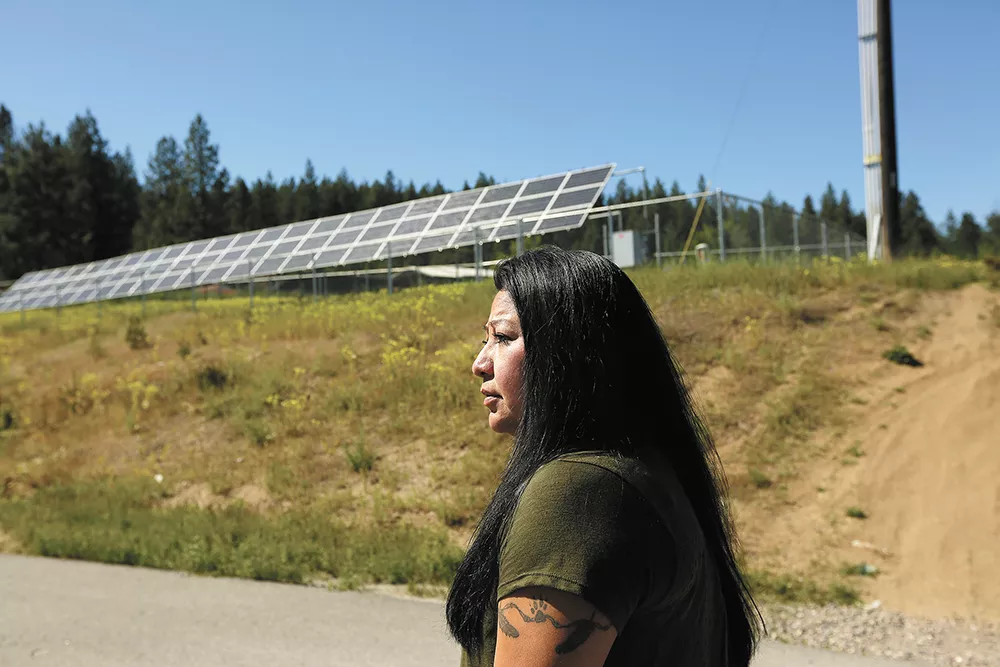
Spokane Tribe finishes casino and works to improve town on reservation
The Spokane Tribe had a busy year, pushing forward with plans for major improvements both on the reservation and off.
After overcoming pushback, the tribe was able to kick off its new $40 million casino in Airway Heights and will open the Spokane Tribe Casino doors for the first time at 7 pm on Jan. 8. Future development on the 145-acre site could include a hotel, tribal cultural center, and new retail and commercial buildings.
The tribe also moved forward with major plans to redevelop Wellpinit, the main town on the tribe's reservation, and a major part of its status as a Promise Zone. The tribe's Promise Zone is one of only 22 in the country eligible for targeted investment to combat poverty. Completing their plans could take more than a decade, but work has already started on a $1 million solar array to support elder housing, the design of a biomass plant that could heat a redesigned town core, and more. (SAMANTHA WOHLFEIL)
Washington State University opens its medical school
A total of 60 medical school students started taking classes at Washington State University's Elson S. Floyd College of Medicine in August, a signature achievement for the university that fought for years to be able to open its own medical school in Spokane. WSU used to partner with the University of Washington for medical education before the two parted ways in recent years. The UW partnered with Gonzaga, and in 2016 welcomed 60 medical students to Spokane. In 2017, Washington State University followed suit. The goal, school officials say, is to help address the doctor shortage in Washington affecting rural areas of the state by recruiting local students. (WILSON CRISCIONE)
Spokane gives convicted felons a fairer chance for employment
Both the city of Spokane and Spokane County joined the national push to ensure that convicted felons get a fairer chance when applying for jobs. In October, the Spokane County Commission voted to "ban the box" on applications for employment with the county, meaning employment applications no longer will ask if a candidate has been convicted by a court of law within the past 10 years. A month later, the city of Spokane took it one step further and banned the box for private employers in the city. Starting in 2019, private employers could face fines for asking about an applicant's criminal history before an interview. (WILSON CRISCIONE)
The Washington State Legislature (almost) fully funds schools
Narrowly avoiding a government shutdown, Washington state lawmakers finally reached an agreement on how to fund education. Gov. Jay Inslee signed a budget deal that adds billions in state funding to schools over the next four years, paid for through a hike in statewide property taxes. At the same time, the deal limits how much school districts can collect through local property tax levies. The deal was widely seen as significant progress in funding schools, though the Washington Supreme Court ruled afterward that the deal didn't fully satisfy its 2012 McCleary decision, which mandated full funding of basic education. Still, even the justices noted that the deal represented progress on that front. (WILSON CRISCIONE)
Inaugural Crave! NW food festival hosts local and celebrity chefs
Despite some rainy weather, the inaugural Crave! NW Food and Drink Celebration in Spokane Valley this past June was successful enough that organizers have already announced plans for year two. Spearheaded by award-winning local chef and restaurant owner Adam Hegsted, Crave! featured 10 events over four days with 50 chefs — both local and nationally recognized names — hosting small plate tastings, demonstrations and other themed events. The second annual Crave! is set for July 12-15, with tickets already on sale at cravenw.com. (CHEY SCOTT)
Kalispel Tribe breaks ground on major casino expansion and forms utility
In February 2017, the Kalispel Tribe announced plans for a $20 million, 40,000-square-foot expansion to the Northern Quest Resort & Casino in Airway Heights. With a new luxury RV resort and kid-friendly gaming and day care centers on the way, as well as new retail and food options, the casino expansion is slated to be finished at some point in 2018. Ground was broken for the first phases of construction in August, at which point more expansion was announced, with additional plans for new market-rate apartments and a Movie & Dinner boutique theater, also expected to open in 2018.
The tribe also finalized formation of Kalispel Tribal Utilities, a tribe-owned utility, through which power can be purchased and sold. By buying wholesale power from the Bonneville Power Authority, the new utility will start by providing power for the tribe's casino and resort and could expand from there. (SAMANTHA WOHLFEIL)
Spokane and Coeur d'Alene continue to grow as a food and drink destination
Following a pattern established over the past several years, the Inland Northwest continued adding restaurants and other eateries throughout 2017, including many spots already considered to be well worth a visit from diners both near and far.
Starting off the year in January was the debut of Kate and Jeremy Hansen's progressive and upscale Inland Pacific Kitchen in downtown Spokane. Later in the year, the couple also announced plans for two dining projects in the revitalized Ridpath Hotel building. In August, the couple debuted the casual biscuits-and-gravy counter Biscuit Wizard inside downtown's Saranac Commons.
The first six months of 2017 also saw the rebirth of The Viking pub, under new ownership by a group of local partners who overhauled the more-than-30-year-old space and its menu while staying true to the pub's neighborhood hangout roots. Spring also brought a new contemporary gastropub on the southwest edge of Spokane Valley; the locally owned Craft & Gather opened in the former Painted Hills Golf Course clubhouse at the end of April. Before summer's arrival, another Northwest-focused eatery, Cascadia Public House, opened on the opposite side of town, at North Spokane's Five Mile Shopping Center. Also new on the north side is Monroe Street Grill, which opened in fall in the former Shari's building at the corner of Monroe Street and Northwest Boulevard.
In the still-growing Kendall Yards development of downtown, Paper & Cup cafe from Chaps' Gina Garcia and Celeste Shaw debuted this past summer, as did the long-awaited grocery shopping destination, My Fresh Basket.
North Idaho also saw its fair share of new restaurants, including Relic Smokehouse & Pub and Midtown Pub in Coeur d'Alene, as well as two new eateries from Chef Adam Hegsted: Republic Kitchen + Taphouse in Post Falls and Farmhouse Kitchen & Silo Bar in Ponderay.
Growth in the beer, wine, cider and spirits sectors also didn't go unnoticed. The past year brought with it the debuts of several new tasting rooms from established local purveyors, including Whistle Punk Brewing, Dry Fly Distilling, One Tree Hard Cider and a Spokane tasting room for Washington's award-winning Maryhill Winery. The new and already popular beer bar Community Pint also opened in the former home of Jones Radiator bar. (CHEY SCOTT)

The Spokane Arena has a platinum year
Although Spokane isn't exactly synonymous with A-list entertainment, whenever a bona fide music luminary comes to town, it's often thanks to the Spokane Arena.
The venue had a particularly impressive 2017, with a number of living legends taking its stage over the course of the last 12 months. It started in March, when pop icon Sir Elton John returned for his fourth Arena gig and played a set list of classics to an adoring, sold-out room. Then in June, legendary singer-songwriter Paul Simon came through town, followed by the Dave Grohl-led rock band Foo Fighters just a few weeks ago.
Even bigger than those impressive acts was Garth Brooks, the best-selling solo artist in history, who rolled into town in November and blew through a whopping seven sold-out concerts at the Arena. That's standard practice for the country superstar, who typically plays multiple shows at each tour stop, but the fervency with which the Inland Northwest embraced him (and his opener and wife Trisha Yearwood) made it abundantly clear that Spokane really loves Garth Brooks. The feeling, it seems, was mutual.
The Arena's management estimated that some 72,000 folks came through the Arena's doors to see Brooks and Yearwood, and Visit Spokane estimated that local businesses raked in something like $14.6 million in revenue during Brooks' stint here. He's got friends in high places, for sure.
On top of its roster of hugely popular performers, the Arena also recently unveiled a new menu, with a food court offering a wider, higher quality variety of items beyond the cheap concessions typically associated with concert going. (NATHAN WEINBENDER)
Gonzaga men reach national hoops championship
At the beginning of the 2016-17 Gonzaga men's basketball season, we were wondering if Przemek Karnowski could come back from injury and whether transfers Nigel Williams-Goss, Johnathan Williams and Jordan Mathews could fit in with the team's homegrown talent, Coach Mark Few's system, and heralded incoming freshman-turned-NBA lottery pick Zach Collins. I guess you could say it worked out just fine, as Gonzaga had the best season in school history, making a run all the way to the NCAA championship game. The effort made 2017's March Madness utterly electrifying for the team and the Spokane community that lives and dies for college hoops. The fact they fell just short in the final to North Carolina, finishing with a 37-2 record, couldn't sour the feeling that these Zags were something special. (DAN NAILEN)
Shawn Vestal keeps Spokane in the literary spotlight
Given that Shawn Vestal’s 2013 short-story collection Godforsaken Idaho won the PEN/Robert W. Bingham prize for a debut in fiction, it was no surprise that his first novel, Daredevils, would prove to be an entrancing tale. The story of a young woman fleeing a fundamentalist Mormon compound in Arizona and a young man chafing at his own mainstream Mormon upbringing in Idaho, Daredevils captures teenage rebellion, a love story (of sorts) and more than a little dose of Evel Knievel-inspired mayhem in a book that earned Vestal the Washington State Book Award for fiction in 2017. Vestal became the third straight Spokane author to earn the fiction prize sponsored by the Washington Center for the Book, following wins by Sharma Shields and Bruce Holbert. (DAN NAILEN)
Spokane cellist takes home Grammy Award
Last February, the list of Grammy Award recipients featured a lot of the usual suspects: Adele, Chance the Rapper, Beyonce, the late David Bowie. But one of those winners, name-dropped several times in the classical categories, should have looked especially familiar to Spokane folks: Zuill Bailey. The cellist and music director of the Northwest Bach Festival added the music industry's most prestigious award to his roster of accomplishments last year, winning for a live recording of his performance of Michael Daugherty's concerto Tales of Hemingway with the Nashville Symphony. Bailey spoke to the Inlander the day after the awards ceremony, calling the experience "exhilarating chaos," and Bailey's career post-Grammy should follow suit. (NATHAN WEINBENDER)
East Sprague and U District grow closer
The links between downtown Spokane and the neighborhoods to the east continue to grow as once-industrial areas are developed for education and technology and major road improvements aim to change the character of East Central.
More than a decade after it was first envisioned, work on the nearly $12 million University District Gateway Bridge was started. When finished, the span will enable pedestrians to easily cross the train tracks from the U District — where Washington State University's new Elson S. Floyd College of Medicine started its inaugural class this fall — to an area of East Central getting more attention.
Across the tracks, a half-mile stretch of East Sprague was given a pedestrian-friendly main street feel over the summer, as a $4.3 million road project brought new sidewalks, trees and lane reductions that will calm traffic through the major commuter corridor. And in March 2017, Avista announced that it plans to build the Catalyst Project on the south side of the pedestrian bridge, with an initial 140,000-square-foot multi-use building that could house high-tech bioscience lab space, offices, classrooms and more. (SAMANTHA WOHLFEIL)
Kootenai Health wraps up major work on second phase of expansion
In North Idaho, Kootenai Health continued expanding its facilities and services with major investments. After spending $57 million on a first phase of upgrades and starting a more than $45 million second expansion phase in 2016, work on many of the new amenities started to get close to completion in 2017. The new Emergency Department expansion was opened to the public, with 13 additional treatment rooms, a new drop-off area that can take five ambulances, and new behavioral health rooms. Work also progressed on the new surgical department, which will more than double in square feet, have more operating rooms, and majorly expand pre- and post-op recovery space. This spring construction will begin on a new hospitality center, a collaboration between Kootenai Health, Community Cancer Fund and Ronald McDonald House Charities. (SAMANTHA WOHLFEIL) ♦




